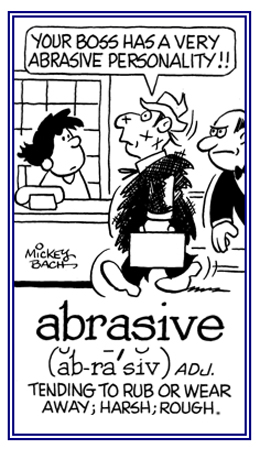rad-, ras-, raz-
(Latin: scrape, scratch, shave, rub)
abradable (adjective), more abradable, most abradable
1. Regarding something which is capable of wearing down or rubbing away by friction; able to erode: The stones in the river were quite abradable through the constant movement of the stream and becoming quite smooth over time.
2. Pertaining to something which makes weary through constant irritation; to wear down spiritually: The constant bickering of her parents proved to be quite abradable on Valerie causing her to be very tired, cross, irritated, and very annoyed with her parents.
2. Pertaining to something which makes weary through constant irritation; to wear down spiritually: The constant bickering of her parents proved to be quite abradable on Valerie causing her to be very tired, cross, irritated, and very annoyed with her parents.
abradant
1. Having an abrasive property, effect, or quality; abrading.
2. A tool or machine used for wearing down or smoothing or polishing.
3. A substance that abrades or wears down.
2. A tool or machine used for wearing down or smoothing or polishing.
3. A substance that abrades or wears down.
abrade, abrades, abrading, abraded (verb forms)
1. To wear down or to rub away by friction or scraping.
2. To erode or to damage something by rubbing its surface too hard.
3. To make weary through constant irritation; wear down spiritually.
4. Etymology: from Latin abradere, "to scrape off"; from ab-, "off" + radere, "to scrape".
2. To erode or to damage something by rubbing its surface too hard.
3. To make weary through constant irritation; wear down spiritually.
4. Etymology: from Latin abradere, "to scrape off"; from ab-, "off" + radere, "to scrape".
abrader
abrase
1. Something that has been scraped or rubbed off, such as skin: The nurse put medication on the abrasion of the child's knee.
The abrasion on Rodney's knee finally healed and the abrasion on Nancy's elbow has been healing very well.
2. Erosion caused by rubbing or scraping, as of rock by wind, water, etc.: Years of abrasions had worn the surface of the stones so they are now smooth.The abrasions on the cliff side were examples of the destructive powers of natural resources, winds, and water.
3. Etymology: from Medieval Latin (about A.D. 700 to A.D. 1500) abrasionem, abrasio, "a scraping"; from Latin abradere, "to scrape away, to shave off"; from ab-, "off" + radere, "to scrape" or "to rub".
1. A scraping or grinding material: Natalie was told that sandpaper, or some other abrasive, would be needed to remove the old paint.
2. A substance used for rubbing or polishing: The cabinetmaker recommended an abrasive that used only natural materials for application on the wooden furniture.
2. A substance used for rubbing or polishing: The cabinetmaker recommended an abrasive that used only natural materials for application on the wooden furniture.
When Glenda went to the store, she noticed that there were at least three kinds of abrasives from which to choose for her home improvement project.
abrasive (adjective); more abrasive, most abrasive
1. Harsh, irritating, or caustic: The politician's abrasive remarks angered the audience with some of them yelling their own abrasive comments back at him.
2. Describing something that scrapes; rough or scratchy: William was advised to use sandpaper or some other abrasive material to remove the paint from the chairs before repainting them.

© ALL rights are reserved.
Go to this Word A Day Revisited Index
2. Describing something that scrapes; rough or scratchy: William was advised to use sandpaper or some other abrasive material to remove the paint from the chairs before repainting them.
The abrasive effect of sandpaper on the wood made it smooth and easy to paint on.
3. A reference to something that is harsh, irritating, or rude: When the talk-show host used abrasive remarks, he insulted many in his radio audience.
Go to this Word A Day Revisited Index
for a list of additional Mickey Bach illustrations.
abrasively (adverb)
A reference to being harsh and rough in one's manner: Jane's abrasively critical comments about her brother's political views resulted in an unpleasant argument.
A substance that is used for rubbing something to make it smooth, shiny, or clean: The abrasiveness of the cleaning material made the sculpture bright and glistening.
abrasor
An instrument used for abrasion.
corrade
corrasion
dermabrasion
The removal of superficial layers of the skin with a rapidly revolving abrasive tool.
erase

